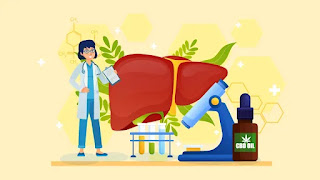One amazing study has my interest peaked. Does CBD affect liver enzymes? CBD is known for its anti-inflammatory and antioxidative properties, so it could be useful in reducing the inflammatory response and protecting the liver against oxidative damage. In experimental models, CBD effectively reduced inflammation, oxidative stress, and promoted the death of malignant cells in the liver.
CBD consumption may reduce the pain, prevalence, and burden of hepatic and liver conditions.
Research suggests that CBD may potentially treat various forms of liver disease; even that caused by pain pills. Liver disease is an umbrella term for conditions that result in a disturbance of liver function. The causes are widespread, consequently including drugs and alcohol, hepatitis A-E, non-alcoholic fatty liver disease, and hemochromatosis. In essence, when the liver is repeatedly damaged, scar tissue replaces healthy liver cells in a process called fibrosis. This scar tissue does not perform any function, further distorting the liver’s internal structure, and interfering with blood flow to and from the liver. It may even cause liver pain.
Eventually, this lack of blood flow kills more liver cells and the result is a continuous cycle of liver scarring. Doctors often focus on the cause of liver disease, for example, alcohol or prescribing antiviral drugs, but in all cases, slowing or preventing fibrosis is the key. Research suggests that cannabis may have anti-fibrogenic properties. In epidemiological studies, CBD consumers have a lower prevalence of liver disease progression than their peers.
CBD and Hepatic Stellate Cell Death
Basically, the cellular mechanisms at work for the development of liver fibrosis chiefly involve specialized cells called hepatic stellate cells (HSC). HSCs play a critical role in the initiation, progression, and regression of liver fibrosis, by secreting fibrogenic factors that encourage other cells to produce collagen and corresponding scar tissue. Consequently, researchers have proposed that activating HSC death could be a solution for reducing liver fibrosis.
In a study published in Cell Death and Disease (2011), the researchers investigated whether CBD could activate and kill HSCs. Because of this study, researchers know that CBD induces apoptosis in HSCs through a cannabinoid receptor-independent mechanism involving an endoplasmic reticulum stress response and downstream apoptotic pathways. HSC death occurred in both human and rat cell lines, as well as in vivo mouse HSCs. They concluded that CBD may provide therapeutic benefit for liver fibrosis. Other researchers have found success by directly and purposefully targeting the CB2 receptor.
Fibrosis Regression Following Chronic CB2 Receptor Activation
In a study published in the Journal of Pharmacology and Experimental Therapeutics (2007), the researchers would chronically activate hepatic CB2 receptors in cirrhotic rats. They did so by treating them with a CB2 receptor agonist daily, for a total of nine days.
All in all, after treatment, arterial pressure improved, activated stellate cells decreased, and there was also a reduction in fibrosis compared to rats treated without the CB2 receptor agonist. These findings suggest that selective activation of liver CB2 receptors significantly reduces collagen build-up and presents as a future treatment for hepatic fibrosis in human cirrhosis.
It is clear that an association exists between endocannabinoid system activation and a reduction in hepatic fibrosis
Reduced Liver Disease and Pain for Cannabis Consumers?
Epidemiological studies have consistently found a lower prevalence of advanced liver disease among cannabis consumers compared to their non-cannabis consuming counterparts. Further, this is true of alcoholic liver disease, non-alcoholic fatty liver disease, and liver disease caused by chronic Hepatitis C viral infection.
Moreover, in a study published in Liver International (2018), the researchers analyzed the discharge records of patients eighteen years and older who reported past or current history of alcohol abuse. In total, they analyzed over 300,000 records from the 2014 Healthcare Cost and Utilization Project-Nationwide Inpatient Sample and studied progressive alcohol liver disease with respect to three cannabis exposure groups: non- cannabis consumers, non-dependent cannabis consumers, and dependent cannabis consumers. Basically, the results showed that among alcohol users, dependent and non-dependent cannabis consumers had significantly lower odds of developing alcoholic steatosis, steatohepatitis, cirrhosis, and hepatocellular carcinoma. Furthermore, dependent cannabis consumers were slightly less likely to develop liver disease compared to non-dependent consumers.
Finally, researchers found the same trends for liver disease caused by Hepatitis C viral infection (HCV). In a study published in the Canadian Journal of Gastroenterology and Hepatology (2018), the researchers found that cannabis-consuming HCV patients were less likely to develop liver disease and had lower healthcare costs than non-consumers, comparatively. However, there was no difference between these two groups regarding the incidence of liver carcinoma or in-hospital mortality.
Nuvita is the cleanest CBD I have found and that is why I would always choose Nuvita especially when it’s all about a healthy body and mind. You can shop at https://nuvitacbd.com/?als=Favorite and use code favorite to save 10%.

Comments
Post a Comment